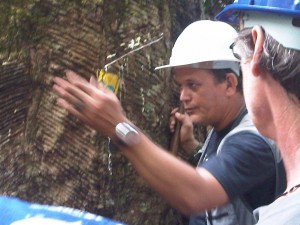November 17, 2009
Gary Gero
Yesterday we saw how indingenous peoples are using intact forest lands, and today we learned about the use of managed forests (and – here’s a preview – tomorrow we consider restoration of deforested areas). We travelled to the town of Xapuri in the southern part of Acre near the Bolivian border to see an “extractive reserve” on which rubber tapping and FSC certified forest management is exercised. This, too, is a way of having the existing forest resources provide economic benefits to reduce the pressure for deforestation. Here the government of Acre is creating economic development opportunities in the city by supporting operations that make use of the natural resources. Seventy families practice rubber tapping in the Chico Mendes Extractive Reserve to obtain natural latex from rubber trees.
Observing the traditional and largely unchanged extraction process in the forest was fascinating. After the latex is extracted, it is then processed at a condom factory, which employs 150 people, in the nearby city of Xapuri. Our visit to this facility to see the production process demonstrated the full cycle of this strategy as the entire output of more than one million condoms are purchased by the Brazilian government for free distribution as part of the health initiative. Similarly, sustainably harvested woods are processed at a mill here into finished FSC certified, high-end flooring boards that are sold around the world. The mill, which we also visited, uses the sawdust and other detrius from this process to run a power plant that generates more than sufficient energy for the plant operations.
We finally settled in for the evening at a lodge built by the rubber tappers association. The lodge has a wood burning stove that also generates electricity for the facility. We had much discussion with Acre state government officials on the possibility of a state-to-state initiative to use carbon markets to support state-wide avoided deforestation.
Tags: Natural & Working Lands, including Forests




